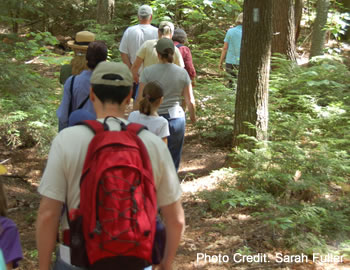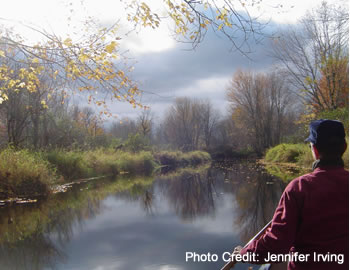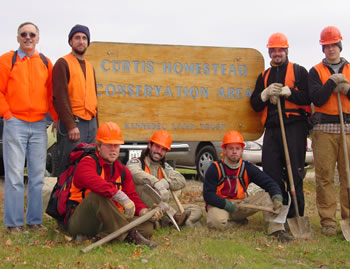Home → Your Woodland → Learn What You Can Do for Kennebec County's Woodlands → A Stewardship Storyline →How can I create a legacy with my woodland?
Your Woodland: A Stewardship Storyline
How can I create a legacy with my woodland?
What is a conservation easement?
One tool for conserving private land, a conservation easement, is a voluntary legal agreement between a landowner and a land trust, municipality, or government agency that permanently limits uses of the land in order to protect its conservation values. Conservation easements allow landowners to continue to own and use their land, as well as to sell it or pass it on to heirs.
When you donate or sell a conservation easement, you give up some of the rights associated with the land. For example, you might give up the right to build additional structures, while retaining the right to grow crops. Future owners of your land will be bound by the easement’s terms. The easement holder is legally responsible for ensuring that the easement’s terms are followed.
Conservation easements offer great flexibility. An easement on property with valuable forest resources could allow continued management for timber products. A landowner who wants to protect rare plants or wildlife and their habitats might restrict certain land uses. Sometimes easements are sold, but more often a landowner donates an easement to a selected organization. If the donation benefits the public by permanently protecting important conservation resources, and meets other federal tax code requirements, it can qualify as a tax-deductible charitable donation.
Do I want to leave a legacy by donating my land?
Land donated for conservation is a meaningful legacy for future generations. If you choose to donate your land, a conservation organization can work with you to address your specific goals. The full market value of land donated to a nonprofit land trust is tax-deductible as a charitable gift, subject to qualifying under IRS regulations..
What if I want to sell my land but don’t want to see it developed?
In a bargain sale, you sell your land to a conservation organization for less than its fair market value. This not only makes it more affordable for the buyer, but can also offer tax benefits to you as the seller.
Land permanently conserved is a gift to your community, a place where children can explore the complexities of the natural world, hikers can find solitude and artists capture beauty, local food and timber can be grown, and we can all learn to live sustainably on the earth.
If you are considering a tax-deductible donation, consultation with a tax professional is essential.
Would you like to learn more?
Read about how members of the Kennebec Land Trust have created a legacy with their woodland in Between Person and Place: Conservation Histories from the Kennebec Land Trust.
Learn about working forest conservation easements (WFCEs).
Read Conservation Easements Keep Working Forests Working, an article in the Spring 2009 issue of Northern Woodlands magazine.
Read Conservation Easements: An Introduction for Maine Landowners, a publication of the Maine Coast Heritage Trust and Maine Land Trust Network.
Read Conservation Options: A Guide for Maine Landowners, a publication of the Maine Coast Heritage Trust and Maine Land Trust Network.
Read The Public Benefits of Conserved Lands, a publication of the Maine Coast Heritage Trust and Maine Land Trust Network.
Would you like to talk with a person about this stewardship step? Here are some partners who can help:


